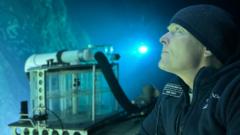**Article:**
When the Titan submersible was reported missing during its descent to the Titanic wreck in June 2023, former Oceangate Director of Marine Operations David Lochridge felt a heavy burden. He hoped that the five individuals aboard could be found safely, yet he feared the worst knowing the potential hazards of the vessel's design and operational protocols. "I just knew...with that deficient equipment, then there would be an incident," he said during an interview.
Lochridge had been dismissed by Oceangate in 2018 after raising safety concerns, and this year’s catastrophic implosion confirmed his worst fears. The US Coast Guard's report released recently attributed the tragic event to a host of failures in safety oversight and equipment testing conducted by Oceangate. "There is so much that could have been done differently...people were sold a lie," he told the BBC, emphasizing a belief that authorities could have intervened much earlier.
Having been with Oceangate for seven years, Lochridge had high hopes when he moved from Scotland to the US to lead marine operations. He was involved from the start in creating a submersible that aimed to take tourists to the iconic Titanic site. His extensive maritime experience—including roles in the Royal Navy and submersible rescue missions—had instilled a deep understanding of the underwater risks.
Initially, there was collaboration with the University of Washington's APL, which gave Lochridge confidence in the oversight of the project's safety protocols. However, when Oceangate ceased working with APL and shifted building responsibilities in-house, his confidence waned. Lochridge assertively voiced his concerns as problems arose with the carbon fibre hull, noting visible defects and improper fitting of essential components.
Following a tense meeting with CEO Stockton Rush to present his concerns about safety, Lochridge was unjustly dismissed from his position. Undeterred, he brought his warnings to the attention of the US government's Occupational Safety and Health Administration (OSHA), which escalated the matter to the US Coast Guard. Yet, he experienced significant retaliation from Oceangate, including a lawsuit alleging various breaches of contract.
Lochridge ultimately had to withdraw his OSHA complaint under immense pressure, lamenting, "They beat us down.” In the years following, the Titan—despite its controversial safety record and a history of structural failures—embarked on multiple dives, culminating in a tragic incident that claimed five lives.
In the wake of this disaster, Lochridge has publicly denounced both OSHA and the Coast Guard for their slow response to his warnings. He stated that had proper investigations been underway, the Titan tragedy may have been preventable. In response, the OSHA acknowledged limitations in their whistleblower protections but confirmed they had referred safety issues to the Coast Guard.
Lochridge's testimony starkly illustrates the need for stronger accountability measures in maritime safety management following the Titan submersible’s doomed expedition to the depths of the Titanic wreck, emphasizing that advancements must be made to ensure the safety of future underwater endeavors.
When the Titan submersible was reported missing during its descent to the Titanic wreck in June 2023, former Oceangate Director of Marine Operations David Lochridge felt a heavy burden. He hoped that the five individuals aboard could be found safely, yet he feared the worst knowing the potential hazards of the vessel's design and operational protocols. "I just knew...with that deficient equipment, then there would be an incident," he said during an interview.
Lochridge had been dismissed by Oceangate in 2018 after raising safety concerns, and this year’s catastrophic implosion confirmed his worst fears. The US Coast Guard's report released recently attributed the tragic event to a host of failures in safety oversight and equipment testing conducted by Oceangate. "There is so much that could have been done differently...people were sold a lie," he told the BBC, emphasizing a belief that authorities could have intervened much earlier.
Having been with Oceangate for seven years, Lochridge had high hopes when he moved from Scotland to the US to lead marine operations. He was involved from the start in creating a submersible that aimed to take tourists to the iconic Titanic site. His extensive maritime experience—including roles in the Royal Navy and submersible rescue missions—had instilled a deep understanding of the underwater risks.
Initially, there was collaboration with the University of Washington's APL, which gave Lochridge confidence in the oversight of the project's safety protocols. However, when Oceangate ceased working with APL and shifted building responsibilities in-house, his confidence waned. Lochridge assertively voiced his concerns as problems arose with the carbon fibre hull, noting visible defects and improper fitting of essential components.
Following a tense meeting with CEO Stockton Rush to present his concerns about safety, Lochridge was unjustly dismissed from his position. Undeterred, he brought his warnings to the attention of the US government's Occupational Safety and Health Administration (OSHA), which escalated the matter to the US Coast Guard. Yet, he experienced significant retaliation from Oceangate, including a lawsuit alleging various breaches of contract.
Lochridge ultimately had to withdraw his OSHA complaint under immense pressure, lamenting, "They beat us down.” In the years following, the Titan—despite its controversial safety record and a history of structural failures—embarked on multiple dives, culminating in a tragic incident that claimed five lives.
In the wake of this disaster, Lochridge has publicly denounced both OSHA and the Coast Guard for their slow response to his warnings. He stated that had proper investigations been underway, the Titan tragedy may have been preventable. In response, the OSHA acknowledged limitations in their whistleblower protections but confirmed they had referred safety issues to the Coast Guard.
Lochridge's testimony starkly illustrates the need for stronger accountability measures in maritime safety management following the Titan submersible’s doomed expedition to the depths of the Titanic wreck, emphasizing that advancements must be made to ensure the safety of future underwater endeavors.






















